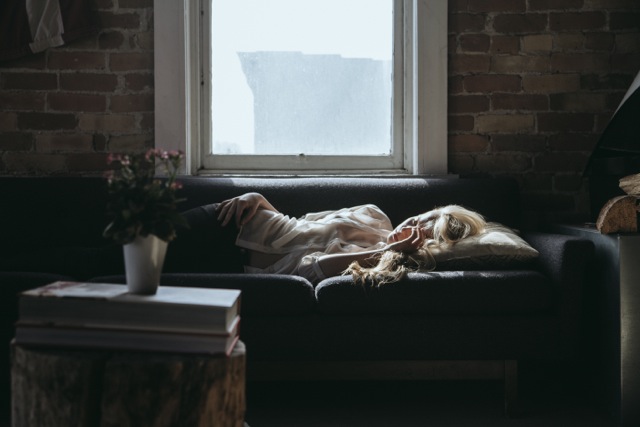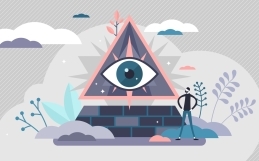
“The best use of imagination is creativity. The worst use of imagination is anxiety.”
-Deepak Chopra
You feel the restrictive sensation of your chest walls caving in as if someone is standing on your ribcage. You’re becoming alarmingly aware of the rhythm of your breathing and wonder if your next breath will be your last. It’s like you’re drowning without being under water. You think, “I can’t breathe. I’m going to die. Just breathe. Just breathe.”
Heart palpitations, shortness of breath, and rapid heartrate are just some of the scary body reactions that occur during a panic attack. These symptoms can intensify and increase, leading to uncontrollable trembling, sweating, tightness around the head, and the feeling of suffocation.
As anyone suffering from chronic anxiety understands, you can’t control when a panic attack hits; and, in fact, trying to control it can sometimes make it worse. The greatest fear for someone dealing with anxiety is losing control in public, feeling trapped in an uncomfortable situation and experiencing humiliation. When anxiety hits, it can make you feel like you’re going crazy—like you have absolutely no control over your own mind. When you can’t find a way to relax, it can feel like you’ve abandoned yourself in the moments of your attack. Like any chronic condition, you can’t just wish panic attacks away, get rid of them with medication, or make them disappear in any given situation. However, you can learn to better manage your anxiety over time to decrease the amount of panic attacks you experience.
Understanding Anxiety
“Anxiety can be defined as the response of an organism to a threat, real or imagined. It is a process that, in some form, is present in all living things.”
-Kerr, Bowen
According to Murray Bowen, father of Natural Systems Theory, there are two types of anxiety: acute anxiety and chronic anxiety. That uncomfortable feeling you get when you’re driving in bad weather that alerts you to drive slowly is an example of acute anxiety. It’s this type of anxiety that reminds you to act with caution in situations that may be dangerous. It’s a naturally occurring alarm in your body that lets you know you’re in danger, so it’s actually a form of anxiety that’s good for your survival. When the stressor is eliminated—for example, the bad weather stops or you reach your destination— the acute anxiety stops as well.
According to Bowen, “Acute anxiety is fed by fear of what is; chronic anxiety is fed by fear of what might be.” If you think about it, when you’re anxious or afraid, it’s usually because you’re thinking of what might be. It’s anticipating a bad future outcome or being fearful of the “what ifs” that fuel chronic anxiety.
Additionally, when being around certain people who are anxious or growing up with anxious caregivers you’ll most likely be dealing with chronic anxiety as well. When I counsel people dealing with chronic anxiety, there’s always at least one other person in their family who struggles with chronic anxiety and takes some sort of medication to deal with it. Bowen describes this phenomenon by saying: “Anxiety ‘rubs off’ on people; it is transmitted and absorbed without thinking.” If we grow up with chronically anxious caregivers or close family members, we absorb that way of dealing with situations. We learn to become anxious when thinking of what might be, because that is how we learned to react to the future. Even if this is the case for you, you can still learn to better manage your anxiety.
10 Simple Tactics for Managing Anxiety
“Living with anxiety is like being followed by a voice. It knows all your insecurities and uses them against you. It gets to the point when it’s the loudest voice in the room. The only one you can hear.”
– Unknown
1. Take Vitamin B6 and Iron: Vitamin B6 and Iron play a crucial role in regulating the production of serotonin in the body. Healthy levels of serotonin, which is also known as “the hormone of happiness,” can help you let go of negative thoughts and allow you to better cope with difficulties when they arise.
2. Engage in Diaphragmatic Breathing: Instead of just taking deep breaths during a panic attack, you want to practice diaphragmatic breathing. When you engage in this type of breathing, your belly expands in and out instead of your chest going up and down. It helps to imagine that you have a balloon in your stomach. Take longer to exhale than inhale, perhaps inhaling for three seconds and exhaling for four.
3. Relax Your Muscles: Another helpful tactic is progressive muscle relaxation, which essentially involves doing a full-body examination and tightening then releasing each muscle group in your body. You can start at your toes and work your way up, taking turns tensing one muscle group for a few seconds, then relaxing it for about 30 seconds. Move on to the next muscle group until you’ve worked your way up to the top of your head.
4. Remember, You Aren’t Dying; You’re Having a Panic Attack: Remind yourself that what you’re experiencing is a panic attack, and the feelings it brings are normal panic symptoms. Describe your symptoms to yourself, allowing yourself to feel them so you can let them go. Instead of judging your symptoms, just acknowledge them. Remind yourself that this is simply a sympathetic nervous system response that will soon pass. The first thing people tend to do is try to fight their symptoms and judge themselves for having them. Instead of engaging in this self-defeating activity, just be with your symptoms and try to quiet your thoughts. That’s the best way to start gaining control of the panic attack without trying to get rid of it right away. Just be with your experience in the moment.
5. Limit Caffeine: Drinking or eating foods with caffeine can make you more anxious. This is because caffeine is a central nervous system stimulant. Consuming too much of it can exacerbate anxiety and panic attacks, because it stimulates your “fight or flight” response. Studies show that this can make anxiety worse, even triggering an anxiety attack. Limiting caffeine is a simple way to reduce your level of anxiety daily. Be aware of all sources of caffeine that may be in your diet such as soda, chocolate, tea, and some over-the-counter medications like Excedrin or Midol.
6. Drink Chamomile Tea: Recent clinical and laboratory research has determined that chamomile is not only relaxing, but can also significantly decrease anxiety and even fight depression. When feeling especially anxious, place four chamomile tea bags in hot water. After letting them soak for 5 minutes, drink up slowly.
7. Self-Soothe with Comedy: Watch your favorite stand-up comedians or a funny sitcom. This way you can get your mind off of your anxiety and have a good laugh. My favorite anxiety reducing activity is drinking chamomile tea and watching standup comedy or old episodes of the TV show Friends.
8. Color: Fans of coloring explain that the activity makes them feel calmer, mentally clearer, happier, and more relaxed. When engaged in their hobby, “colorists,” as they call themselves, say their worries temporarily fade away. This isn’t totally shocking when you consider that all arts and crafts hobbies have the power to focus the brain in a way that’s similar to meditation.
9. Exercise: Studies show that 20 minutes of exercise is all it takes to reduce symptoms of anxiety. Exercise will not only make you feel better about yourself, but will also flood your body with endorphins. Some researchers even believe that increasing your body heat, a natural result of exercise, may alter neural circuits that control cognitive function and mood, including those that affect the neurotransmitter serotonin. Researchers believe this response can boost your mood, increase relaxation, and alleviate anxiety.
10. Have confidence in yourself. You can better manage your fear of what might be by having confidence and a deep knowledge that you can meet, be with, and get through any experience that may arise. The more you do it, the more confident you become. Think about a time you got through a difficult task and how you were able to do it. Coming to trust in yourself and your ability to get through life’s inevitable difficulties will help to decrease the “what ifs” of tomorrow.
Just remember when experiencing anxiety or a panic attack that you’re going to be okay. Keep these tips as a way to help deal with anxiety when it hits. Choose one that will work for you in that moment, or use them over time to manage your symptoms. I understand that the feelings of anxiety are painful and can be debilitating. Find the strength to sit with them and know they will pass. They may not go away right away, but soon they will be gone. When they have faded away, remember you have survived, and you are resilient. Evoke the saying. “This too shall pass.” And if you’ve tried everything but still suffer from debilitating anxiety and panic attacks, please seek the support of a mental health professional who specializes in anxiety related issues. Seeking help can make a world of difference in your quality of life.
Talk soon,
Dr. Ilene
Article edited by Dr. Denise Fournier






I must say it was hard to find your blog in google.
You write awesome posts but you should rank your blog higher in search engines.
If you don’t know 2017 seo techniues search on youtube: how
to rank a website Marcel’s way